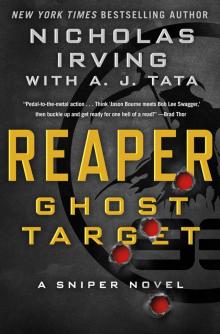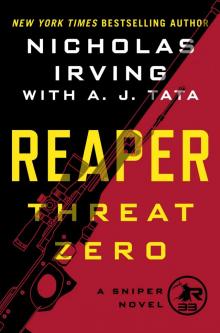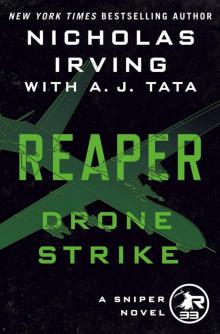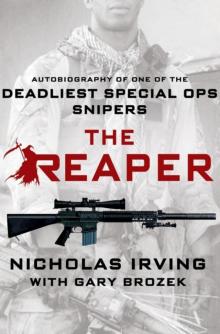- Home
- Nicholas Irving
Threat Zero Page 12
Threat Zero Read online
Page 12
That’s good. She hadn’t really thought through the Muslim angle. That should help with the media pit bulls going after the president, who had taken a thousand cuts for alleged anti-Muslim beliefs. Unmuting the volume, she listened as Rocky Campagne, rising star at CNN, laid out the most salient points of what needed to be conveyed.
“High-level sources in the intelligence community have disclosed that the president has personally authorized a mission to kill the family members of those believed to be involved in the Camp David ambush. Already we have reports of an attack in Crimea and a developing situation in Iran near the Caspian Sea. Initial reports indicate that even though the primary suspect is a former Army Ranger named Corporal Sammie Samuelson, the president wanted to divert attention that a white male might have planned and executed this terror incident to shift the blame to members of the Islamic community.”
She watched Rocky’s handsome, square-jawed face and copper eyes, thought about the last time they’d slept together, got a little turned on, punched the mute button, and said, “Perfect.”
Brookes slid out of bed, pulled on her exercise clothes, and walked onto her porch. The morning air was cool, buzzing with everything coming alive in May. There were few pleasures like springtime in Virginia. Just dope up with whatever antihistamine worked best and enjoy the splendor of azaleas and dogwoods blooming brightly, creeks and rivers flowing fully, and everything in sight growing.
She ran her hands along the smooth spandex of her running outfit. It was black with yellow flames shooting upward from the ankles. The pants were also functional, reflecting light during the hours of darkness. Touching her nose to each knee as she stretched, Brookes felt her hamstrings tighten. She punched in her Spotify running playlist, which included Snoop Dogg, the Eagles, and Bob Marley, among others. She checked the time—7:16 A.M.—and knew she had to hustle. Lastly, she clipped her trusty Ruger holster on a wide riser belt she wore under her lightweight windbreaker, a souvenir from when she was a pacer for the Marine Corps Marathon in Washington, D.C.
Stepping off the porch she ran toward the boathouse and then turned north along the river, following a game trail that she had worn into a bona fide running trail over the years. Approaching her fifteen-foot-high compound wall, she pressed a small fob in her windbreaker. The metal gate door opened and she continued running as the gate closed behind her. Keeping an eye for moccasins and copperheads, she darted at a seven-minute-a-mile clip for nearly three miles. The trail zigged and zagged and started to climb into a hilly, rocky area. She slowed as she dipped over a ridge into a small hollow framed by large rocks on three sides.
She drew her pistol and stepped behind a large gray chunk of granite. A copperhead snake lurched to her right about ten feet away.
“No need for the pistol, Sloane,” a voice called out.
“If we were texting, I’d send you an ‘LOL’ right now,” she shouted.
“Well, nothing funny about anything that’s happening,” the man said.
“Fox News is calling you the most dishonest man in the country,” she said. “Based on that, I think arming myself is warranted.”
She heard a twig snap around the corner of the rock. Another footfall rustled some damp leaves. She slid her finger inside the trigger housing of the Ruger.
“I’m actually back here,” the voice said. Josh Henry, former CIA director, previous bureaucrat in the Department of State, and longtime political party operative, was standing directly behind her. The copperhead had most likely responded to his movement, Brookes thought. And more to the point, who was on the other side of the rock?
As she turned to confront Henry, she felt a presence behind her.
“You didn’t think I’d come alone, did you?”
An arm chopped down on her hand, knocking the pistol loose.
“Hey!” she snapped.
Brookes cracked a sharp elbow into the ribs of her rearward assailant. She spun away and landed a roundhouse kick to the man’s face. Wishing she had steel-toed boots instead of running shoes, Brookes cradled the man’s head and slammed her knee into his face. The man’s nose made a loud cracking sound as blood splattered everywhere.
She stepped away and spun one more time, placing the heel of her shoe in the man’s temple. He had been leaning over, holding his hands to his face, but now was tumbling to the ground in the fetal position. Brookes picked up her pistol, spun and aimed it at Henry.
“Good job,” he said. “You nearly killed the president’s briefer.”
Henry was aiming a pistol at her, also. By the looks of it, the handgun was a Sig Sauer P210.
“This pantywaist?” she said, tossing her chin over her shoulder. “I’ve had better fights in Gymboree with my niece.”
“Neither of us wants to pull the trigger here,” Henry said. “Why don’t we just relax.”
“That’s where you’re wrong. I’d shoot you in a heartbeat. Just like I didn’t hesitate on your patsy here. You wanted the meet. Here I am. Let’s meet. Put your gun away first and then I’ll consider holstering mine.”
Henry was dressed in khaki pants, golf shirt, hiking boots, and an unzipped lightweight blue jacket. He slid the pistol into a holster on his left hip.
She stepped back so that both men were in her field of view. She took a brief glance to her left to make sure Henry hadn’t brought along any other guests. Brookes then looked at the briefer, who was huddled on the leaves and trail wearing shiny brown loafers, dress slacks, a button-down shirt, and blazer. His glasses lay broken next to him. His coiffed brown hair was askew.
“It’s your dime. I’ve got a workout to get in. Tell me why I’m here,” Brookes said. Fully aware that either man may be wearing a wire, she measured her words, placed the onus on Henry.
“I intended to have Miles Everett here brief you on some developments with Team Valid,” Henry said.
“I’m sorry. I don’t know what you’re talking about,” Brookes said. “Further, if Everett is the president’s briefer, he works for the director of National Intelligence, not you. Where’s your buddy General Dillinger on all this?”
“Dillinger is aware that we are here talking to you,” Henry said.
“Excuse me? You asked for this meeting and you tell Dillinger, you might as well be telling Jeff Bezos and the Washington Post.”
Henry sighed and ran a hand over his bald scalp. All of this was an act for Brookes. She went into every situation believing that someone could be wearing a wire.
“Come on, Sloane. Dillinger is on board. He’s got as much to lose as anyone.”
Brookes paused, looked down at the briefer, who was now on one knee.
“You broke my nose,” he mumbled through a bloody hand.
“You stained my new running outfit. We’re even. Get over it,” she countered.
“I brought Everett here to discuss what we have in place.”
She pointed at Everett. “Wearing a wire, Everett?”
“No,” he said.
She pointed at Henry, “Wearing a wire, Josh Henry, former CIA director?”
“No, and we’ve discussed this.”
“Okay, talk,” she said.
Everett stood and leaned against the rock she had originally been hiding behind. He pulled a handkerchief from his pocket and held it against his nose. His face was already swollen and bruised.
“Let me try to start while Everett gets his composure,” Henry said.
“If somebody doesn’t say something useful in about ten seconds, I’m going to keep running and call the cops that I’ve got intruders on my land,” Brookes said.
“Team Valid is officially cut off,” Henry said. “Everett here was in the briefing at five this morning. He updated the president on the dossier that the FBI is building on Corporal Samuelson. He appears to be the ring leader, but a new theory is emerging that he might also be a lone wolf.”
“Really?” she asked. “What about the others?”
“The ‘others’ are still in play. B
ut Samuelson is sticking. The president seems interested in him.”
She stared at Henry for a long moment. Studied his features, seeing years of State Department meetings etched into the soft crags. Absent from any of his comments was any reference that the briefer had actually told the president about Team Valid. The “new theory” was part of their plan. This meeting, she supposed, was an update to tell her that everything was going according to plan. They could have done this via secure chat, though they were trying to have the smallest footprint on communications.
“Okay, so why the meet and greet here?”
“Well, you needed to know. You’ve got a lot at stake here. If this president goes down, we are counting on you. The vice president doesn’t have the flair to energize the opposition base that the current president does. So we need to give you a personal heads-up that Samuelson’s family is going down, along with the others.”
“A personal heads-up,” she said under her breath. “Why do I think it’s more than that?”
“There’s nothing more,” he said. “Obviously none of this can be discussed on email, text, phone, and so on.”
“And we recovered your MacBook,” Everett said through bubbling spit and blood.
Brookes snapped her head toward the briefer. He had a leering grin on his face, as if he had been waiting to say those words out loud. Perhaps he already had, to someone else?
“That’s right. It was in Samuelson’s apartment,” Henry confirmed.
Dropping her need to be circumspect, she asked, “What was it doing there?”
“For some reason Carly Masters trusted him,” Henry said.
“Where is it now?” she asked. Until she had it back, the MacBook was still a liability. Recovering the computer wouldn’t completely cover her ass, but it would go a long way to making her life easier. The cloud had complicated things, but she believed she had taken care of most of that.
“In a safe place,” Everett mumbled.
“Safe my ass. Give it to me, you little twerp,” Brookes said.
“Sloane, just relax. We’ve got it locked up until the storm passes,” Henry added.
She looked from Everett to Henry. They weren’t carrying any backpacks or satchels that could hold a MacBook. Satisfied they were telling the truth, she asked, “So what’s the trade?”
“No trade, Sloane. We hold on to that until everything is wrapped up. Then we either destroy it or give it back to you. The worst place for that thing right now is in your possession.”
“It’s my computer. I’ll be the judge of that,” she countered.
“We know what is on that hard drive. Your work with Raafe Khoury in the Senate Intelligence Committee resulted in some transgressions. We have your back.”
“You have my back?”
“Yes. Samuelson is good for the ambush. The Sultans and Perzas have been eliminated. Khoury is dead. You’re covered.”
She thought about Raafe Khoury, her former information technology chief. The Pakistani man was an IT genius. Apparently too smart, though. He had made possible everything she needed done. This was all good news though. Perza family dead. Check. Sultan family dead. Check. Khoury dead. Check. Now her big secret resided with a few loyalists who wanted plum jobs when she became president. She was happy to trade the power for protection.
“And the president will be revealed with Team Valid when they go after Samuelson’s family.”
Presidential scandal with bite. Check.
“Who are they?” she asked.
“Who is who?”
“His family. Who’s going to be killed?”
“Samuelson’s only remaining sibling is a woman formerly known as Valerie Samuelson,” Henry said. “His parents have gone off the grid.”
“Never heard of her. Formerly?” Brookes said.
“Actually, she doesn’t go by her maiden name. She’s an FBI agent,” Henry said.
“An FBI agent? The president’s going to kill an active agent?”
This was even better than she could have imagined. When the agent was dead, she’d slip that info to Rocky Campagne and it would be his big scoop. They had discussed him being her press secretary previously. This would make it a lock. Of course, it was unlikely that President Smart knew anything of the attacks.
“The instructions are to kill every family member of the attackers,” Everett interjected.
“Her name?”
“Valerie Hinojosa.”
CHAPTER 12
Harwood low crawled in the heat of the afternoon sun. His face was white, covered in sand and dirt. His mouth was dry as cotton as he sucked hot water through the hose of his hydration system.
The crack of rifle fire snapped overhead. He didn’t know if his two teammates were in a fight with the advancing Iranian military below his position or if they were both targeting him. Stunned that Weathers had surprised him, Harwood was just now coming to grips with the reality that Stone and Weathers were leaving him for dead. Was it his conflict with Stone? His argument with Hinojosa? Had she instructed them to ditch him?
Hinojosa’s text about the TacSleeves being burned was clear enough. Someone had hacked into their communications system. If she was going to dump him, why would she warn him and the team? Had something changed in between killing the family and their labored exfiltration?
He thought about the slip of paper.
Baku.
She knew something might go wrong.
The puff of dust in his face and the echoing of machine-gun fire focused him back on the mission at hand: staying alive. Thankfully he had his SR-25 three-point sling snapped into his outer tactical vest. He had his pistol, knife, and rifle. His hydration system was about one-third full and he had an MRE pouch in his cargo pocket. Slim pickings for someone dumped in the mountains of Iran.
As he sought cover, he found a sheer cliff that fell forty feet into a ravine. The small gorge had the twinkle of water at the bottom. Probably not drinkable, but definitely good cover and concealment. He slid over the lip of the rock formation and did his best to lower himself using toe- and fingerholds. He was exhausted, though, and his concentration wasn’t perfect. His boot slipped on a narrow wedge of rock and he was suspended by his two hands, fingers holding over two hundred pounds of gear and his body. His feet scraped for purchase as he chanced a look over his shoulder. He had twenty feet to go and there was no telling the surface at the bottom. Could be rocky. Could be muddy.
His fingers gave way and he bundled into a tight ball, executing a parachute-landing fall, keeping his feet and knees together. The bottom of the ravine was in between rocky and muddy. Just like after every parachute jump, Harwood did a quick inventory of himself. No broken bones. Maybe a bruised hip. Weapons intact. Rucksack okay and probably saved him from a broken back. Good to go.
He studied the small trill of water and decided to follow its flow, which perhaps would lead him to the Caspian Sea. That body of water couldn’t be more than ten miles away. He could do ten miles on the MRE and the limited water. From there he could improvise, provided the Iranians didn’t cut him off. They would presume he went west, toward the Turkish border. Instead, he began a light jog, splashing through the mud and rocks to the north, toward the Caspian Sea and hopefully Baku, the city Hinojosa had mentioned to him, and whatever fate may hold for him there.
After two hours, the ravine opened to a meadow. The sun was setting to his back behind the mountains from which they had fought this morning. A large body of water lay a mile or so to his north. The Caspian Sea.
He found a good camouflaged location and waited for sunset. He ate his remaining ration, a bland-tasting spaghetti and meatballs. Harwood wasn’t a food snob. Rather, he viewed food as fuel. He sucked his hydration system dry and watched the shadows grow long as the sun set. Using his sniper scope, he studied the small village on the shore. There were fishing boats tied to a wooden pier. A few men on the boat farthest from the land hauled up a net and dumped a bevy of fish onto the dock. Two men
jumped out and began cleaning the fish, tossing the remains into the water. It might have been his imagination, but he thought he could smell the guts and blood from his location a mile away. The breeze was off the sea toward him so it was possible. There were about twenty buildings in the village, fifteen of which looked like residences and the rest shops or maybe a restaurant. Harwood was familiar with fishing villages. They were simple operations. Enough homes for the fishermen and their families. Stores to purchase basic provisions, especially netting and lines. A pier to tie off the boats. And a major highway artery to move the goods to the big cities where the restaurants needed their product. It was all there.
Harwood was banking that the town would shut down early and he would be able to secure one of the boats and make his way to Baku, which his memory told him was some fifty miles to the northwest. It would be the first big city he got to. Once there, he would figure out a plan.
The last of the fishermen cleaned up well after dark, but Harwood was patient. When he saw the lights go out in the last of the houses, he collapsed his bipods and removed his scope, stuffing it into his rucksack. While the meadow was open, he was able to move swiftly through some tall grass until he reached the two-lane asphalt road. To his right was the road rising into the darkness. On the horizon he could see lights like a halo over some city he would never visit. To his front was the Caspian Sea, its waters lapping gently at the muddy shore thirty meters away. To his left was the village; the first building appeared to be a general store, as he had guessed. The rest were weatherworn and sagging one-story shacks, most likely the homes of the fishermen, passed down through decades if not centuries of mining the sea.
A boat would be their most prized possession. The only way to feed their family, to survive. Harwood thought about the morality of stealing a peasant fisherman’s boat to survive. While not happy with the internal debate and the repeated outcome—it’s not right—he could think of no other option. Most likely the fishermen were wholly disconnected from the Iranian government, their military and their support of terrorism around the world.

 Ghost Target
Ghost Target Threat Zero
Threat Zero Reaper: Drone Strike: A Sniper Novel
Reaper: Drone Strike: A Sniper Novel The Reaper: Autobiography of One of the Deadliest Special Ops Snipers
The Reaper: Autobiography of One of the Deadliest Special Ops Snipers